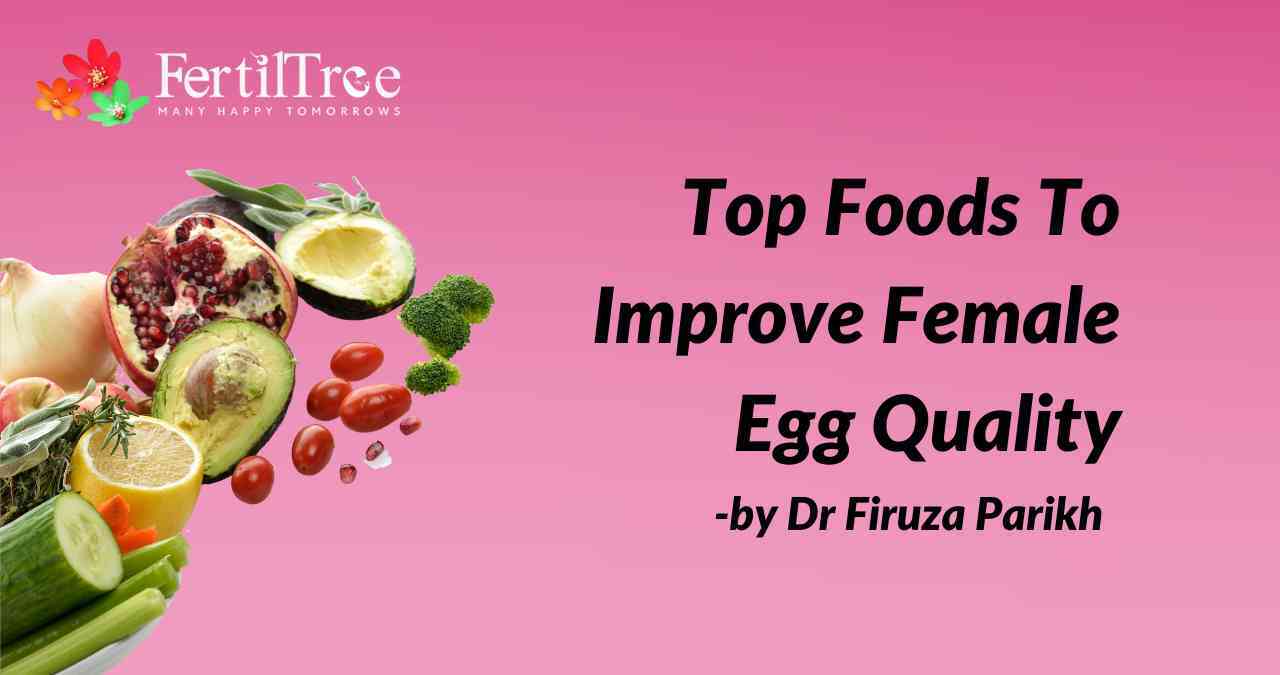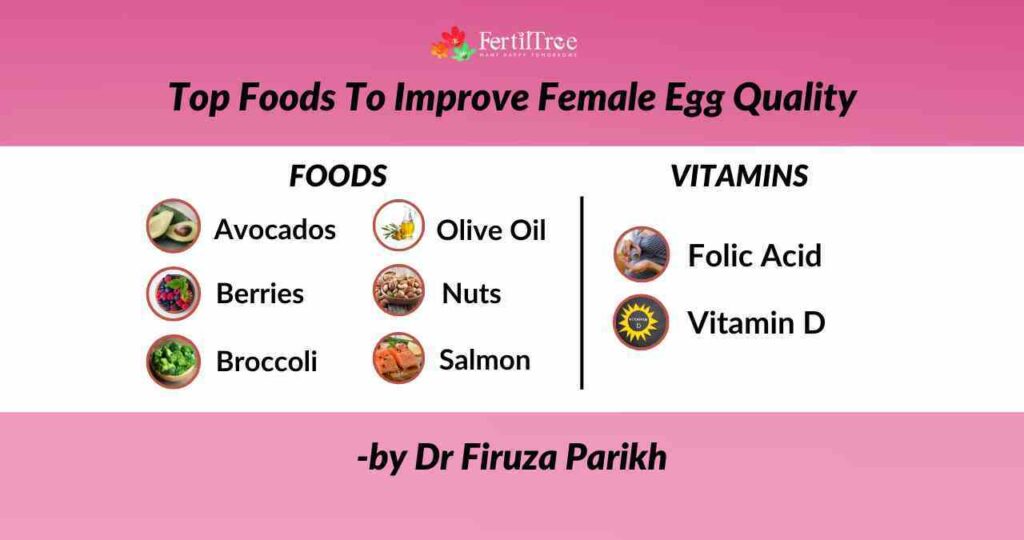
When it comes to the idea or plan of having a baby to start a family, beyond picking out baby names and imagining the perfect nursery, it is essential to be physically and mentally prepared and ready. Egg quality can make a big difference in how quickly and easily we conceive, as eggs with high quality have a better chance to develop into an embryo and implant in the uterus. This increases the chances of getting pregnant. Since it takes 90 days for a single egg to prepare for ovulation before it reaches full maturation, factors such as health, lifestyle, hormones, stress, and diet become quite important.
So, how do we ensure that our eggs’ quality remains fine? Well, as it turns out, what we eat is very important. In this post, we share the best foods to improve your egg quality to achieve a healthy pregnancy.
Read more: Signs of Poor Egg Quality
Top Foods to Improve Female Egg Quality: Table Of Content
Importance Of The Quality Of Eggs For Conception
The quality of eggs plays quite a pivotal role in the path to motherhood. Various factors, including diet, stress, lifestyle, and overall health, influence the quality of the eggs as they mature over a 90-day period.
Having good quality eggs means:
- Sperm have a better chance to fertilise the egg.
- Better chances of the embryo implanting in the uterus. Age can impact egg quality, and as women get older, the quality and quantity of these eggs decrease. So, while women in their 30s or 40s can still have babies, they might need extra help from doctors or should take special care of their health, including eating healthy.
What Are The Signs Of Bad Egg Quality?
Signs that your eggs might not be at their best include:
- Trouble getting pregnant
- Periods that don’t come on time or skip a month
- Menstrual cycles that are shorter than usual
You can take certain tests to see if your egg quality is up to mark. Generally, many take the Anti-mullerian hormone (AMH) blood test to check on their egg supply. Another way to learn about your egg reserve is by having a special ultrasound. In this test, doctors count small sacs in your ovaries called follicles. The doctor will add up these follicles and inform you of your Antral Follicle Count. This will give you a good idea about how many eggs you have left in your ovaries.
Top Foods To Improve Female Egg Quality and What To Avoid
Usually, the general advice for eating to gain healthy eggs is to follow a well-balanced diet, which includes:
- Complex carbohydrates, including whole grains like brown rice, oats, and wholemeal bread
- Plenty of fruit and vegetables daily
- Organic foods
- Oil-rich foods like fish, nuts, seeds and olive oil
- Avoiding trans fats
- Increase intake of fibre
- More fish and organic eggs than red meat
- Steer clear of additives, preservatives, and chemicals such as artificial sweeteners
- Reduce or avoid sugar, both on its own and that which is hidden in food
- Reduce or eliminate caffeine, e.g. coffee, colas
- Eliminate processed foods as much as possible.
Read more: Egg Freezing Process in India
Foods to Improve Female Egg Quality

Read more: Best Foods To Increase Sperm Count and Motility
Here is a list of some of the healthiest food items for improving your eggs:
- Broccoli: Broccoli is known for its folate content. This antioxidant plays a crucial role in egg maturation and helps with embryo implantation.
- Salmon: Rick in omega-3 fatty acids, salmon is especially important for women over 35. These fatty acids can potentially enhance egg quality and even slow down ovarian ageing.
- Brazil Nuts: With its rich selenium content, It helps create a healthy environment for the production of eggs.
Now, let’s move on to the vitamins that will improve your eggs quality.
- Folic Acid: This is a vital vitamin for those planning a pregnancy. It’s recommended not only when you’re trying to conceive but also during pregnancy.
- Vitamin D: If you’re on the path to parenthood, make sure that you get adequate Vitamin D to maintain your levels between 40 and 50 units.Omega-3 Fatty Acids: A daily intake of 600 mg to 100 mg of Omega-3 will help. These fatty acids play a vital role in supporting fertility.
The following may create negative effects on fertility:
Trans-unsaturated fatty acids and unhealthy diets, especially those high in red and processed meats, sugary treats, and sugary drinks, can negatively affect fertility in women.
Now, while we may not be able to lower our age or change our genetics, we can control the food we eat. With this in mind, remember that a fertility-friendly diet might be the step you need to set you on a joyful pregnancy path.
It’s not just women who need to watch their diet. For men, maintaining a healthy weight is crucial. Being overweight can lead to low sperm count and poor sperm movement. A balanced diet can help men produce strong sperm, increasing the likelihood of conception.
Fruits To Improve Female Egg Quality
- Avocados: When it comes to nutritious fruit, you can turn to avocados. With its high content of monounsaturated fat, it will help you improve the health of your eggs and maintain good reproductive health.
- Nuts and Dry Fruits: If you are looking for a great source of vitamins, protein, minerals, and antioxidants, nuts and dry fruit are the answer. Brazil nuts are rich in selenium. This mineral helps protect eggs from damage and also acts as a defender against harmful substances. This further helps with better egg production.
- Berries: Berries are packed with essential nutrients like Vitamin C, folate (folic acid), and powerful antioxidants. They not only safeguard eggs against harmful free radicals but also contribute to their strength as well as health.
Foods to Avoid
When you’re trying to boost your fertility, it’s incredibly important to be mindful of the foods you eat. Some foods might hamper your plans because of their inflammatory nature, which has ties to fertility issues like endometriosis and PCOS.
- Soy: It’s a good idea to watch your soy intake. While soy has many benefits, it also contains compounds that closely resemble estrogen. Overeating soy, especially in its processed forms like powders and bars, can alter your hormonal balance. Too much estrogen from soy could impact your fertility.
- Alcohol: As you try to conceive, consider cutting back on alcohol. Research indicates that regular drinking can reduce fertility and make conception more challenging. And if you’re a smoker, it’s a good time to quit. The nicotine in cigarettes is not kind to eggs.
- Sugar: Beware of refined sugars, like high fructose corn syrup. When you have too much of these, they can cause your blood sugar to randomly spike and dip. Such fluctuations can be problematic for your reproductive system. Excessive sugar intake can also throw off your insulin and hormonal balance, possibly making conception more difficult.
- Avoid All Trans Fats
Avoid trans fats at all costs; they can make it harder for your body to use glucose due to increased insulin resistance. This not only derange your ovulation but might also make conception challenging. In fact, research suggests that the more trans fats you eat, the higher your risk of facing ovulation-related fertility problems.
Where might you find these trans fats?
- In many packaged snacks and store-bought baked items
- Some animal-based foods
- Popular foods like French fries
- Certain types of margarine
So, make sure that you avoid the food mentioned above items if you plan to get pregnant soon.
- Avoid highly processed Carbs.
Try to add more complex or slow-digesting carbs to your diet, such as fruits, veggies, beans, whole grains, and brown rice. These good carbs, rich in fibre, gradually regulate your blood sugar and insulin levels. On the other hand, steering clear of highly processed carbs is also quite necessary because they can easily turn into sugar.
Animal Sources Of Proteins Include proteins from animal sources like meat, fish, and eggs also play a role when you’re trying to conceive. For instance, eating salmon and sardines is not only safe but beneficial for potential mothers. They contain vital nutrients like DHA and omega-3 fatty acids, which help develop the baby’s neurological system. Eggs, another protein source, are also packed with essential nutrients, rich in choline and Omega 3, both crucial for the baby’s brain growth. Doctors often suggest organic eggs for the best nutrition.
Other Ways to Improve Female Egg Health for Pregnancy
- Try To Avoid Stress: It’s no secret that everyday stresses can take a toll on your fertility. When stress hormones like cortisol and prolactin rise, they can interfere with ovulation. Try relaxation activities like yoga, meditation, or even a simple walk to fight this. The key is to find what calms you and make it a part of your routine.
- Watch Your Weight: Maintaining a balanced weight is vital for your reproductive health. Being overweight can lead to hormonal imbalances, which can, in turn, affect ovulation. Aim for a Body Mass Index (BMI) from 18.5 to 24.9. To give you a reference, if you’re 5 feet 6 inches tall, you should weigh between 52 kg and 70 kg. A healthy diet and regular exercise blend can help you hit your target.
- Boost Blood Circulation: Your ovaries need a steady supply of oxygen-rich blood to produce healthy eggs. One way to ensure they get it is by staying hydrated. Another way is through yoga, which can help increase blood flow to the reproductive organs.
- Consider Freezing Your Eggs: Egg-freezing can be a good option if you’re considering having kids later in life. It gives you the flexibility to plan for the future, ensuring that age doesn’t catch up with your fertility plans.
- Have a Nutrient-Dense Breakfast: For those with PCOS, breakfast can be more than just the first meal of the day. By consuming most of your calories in the morning, you can help regulate testosterone and insulin levels, which are essential for fertility. Focus on foods like oats, proteins, and healthy fats to start your day right.
To continue your progress towards a healthy pregnancy, we recommend contacting our skilled medical experts or arranging an appointment at our renowned IVF centre in Mumbai. Our team of professionals will provide expert guidance and individualized care to help you start your journey towards parenthood.
Read more:
How do specific foods affect egg quality?
What are the best sources of antioxidants for improving egg quality?
How important are omega-3 fatty acids for egg health?
Are there specific vitamins that are beneficial for egg quality?
How soon can dietary changes affect egg quality?
Book A Consultation

